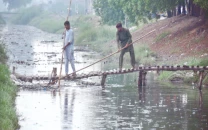Scarcity of rain affects gram crop
Drought in coming weeks may deprive millions of people across country of the vital food

Lack of rain in Noorpur Thal will make it difficult to meet gram production target. If there was no more rain in the next 10 to 15 days, millions of people across the country may be deprived of the gram nutrition.
Reportedly, the lack of gram cultivation may also cause major losses to the national economy. People associated with agriculture told The Express Tribune that there was less rains in recent years during the gram cultivation. Nowadays, when it is time for the cultivation, there was no possibility of rains due to which the gram crop had started to be adversely affected, they added.
Crops were starting to dry up due to these severe water shortages. Farmers and others in the cultivation profession including Muhammad Shafiq Waghra, Amir Alam Khan Pathan and Shafqat Hussain Gujjar further said that the Noorpur Thal area had been suffering from drought for the last few years. The gram crop agriculture was very weak, they explained.
The Toka disease was attacking the gram crop due to a lack of timely rains in the region. They also shared that due to the lack of rains, the rate of gram had crossed Rs10,000 per 100 kilogramme bag. The stockists had already stopped selling gram and created an artificial shortage of the product in the market.
Reportedly, the gram from Australia cannot compete with Pakistani gram especially because Noorpur Thal's gram was widely regarded in the region as the best in terms of nutrition and taste. Due to these issues of production, demand and supply, the price for the Noorpur Thal gram was also increasing. The farmers elaborated that if there was no rain in the area during the first week of February, the gram crop production could be in a serious situation this year which would possible damage the national economy.
Millions of people across the country would also be deprived of this natural and nutritious gram, they stated. Reportedly, the gram grown on the rain-fed lands of Noorpur Thal tehsil was free from all harmful effects as artificial fertilisers and toxic sprays available in the markets all over Pakistan were not applied here. In October last year, unseasonal rains resulted in a drop in chickpea production.
Noorpur Thal is the second largest tehsil in Pakistan in chickpea cultivation, but the farmers were facing a decline in production because of unseasonal rains and diseases. Around 90% of the population of Noorpur Thal is dependent on agriculture and waits for rainfall to harvest crops. When sufficient rains occur during the season, the farmers cultivate chickpea in their fields, which is ready to harvest in five months. If there are normal rains, the tehsil offers a lush green view for around eight months each year.
The production in the tehsil includes 75% black and 25% white chickpeas. The crop is cultivated over 400,000 acres in the region. Consumption of black chickpea helps overcome calcium deficiency in the body. After eating the legume, a person feels stronger. People are also advised to eat black chickpea to control diabetis. Rainfall is vital for the production of chickpea.
From cultivation till the harvesting no pesticide is sprayed and no fertiliser is used. If it rains on time after the sowing, the average yield is two to three 100kg sacks of chickpeas per acre. However, if there is no rain, the output drops to less than half because the fields are not irrigated and are dependent on rainfall for water needs. This production does not even cover the expenses of the farmer.



















COMMENTS
Comments are moderated and generally will be posted if they are on-topic and not abusive.
For more information, please see our Comments FAQ